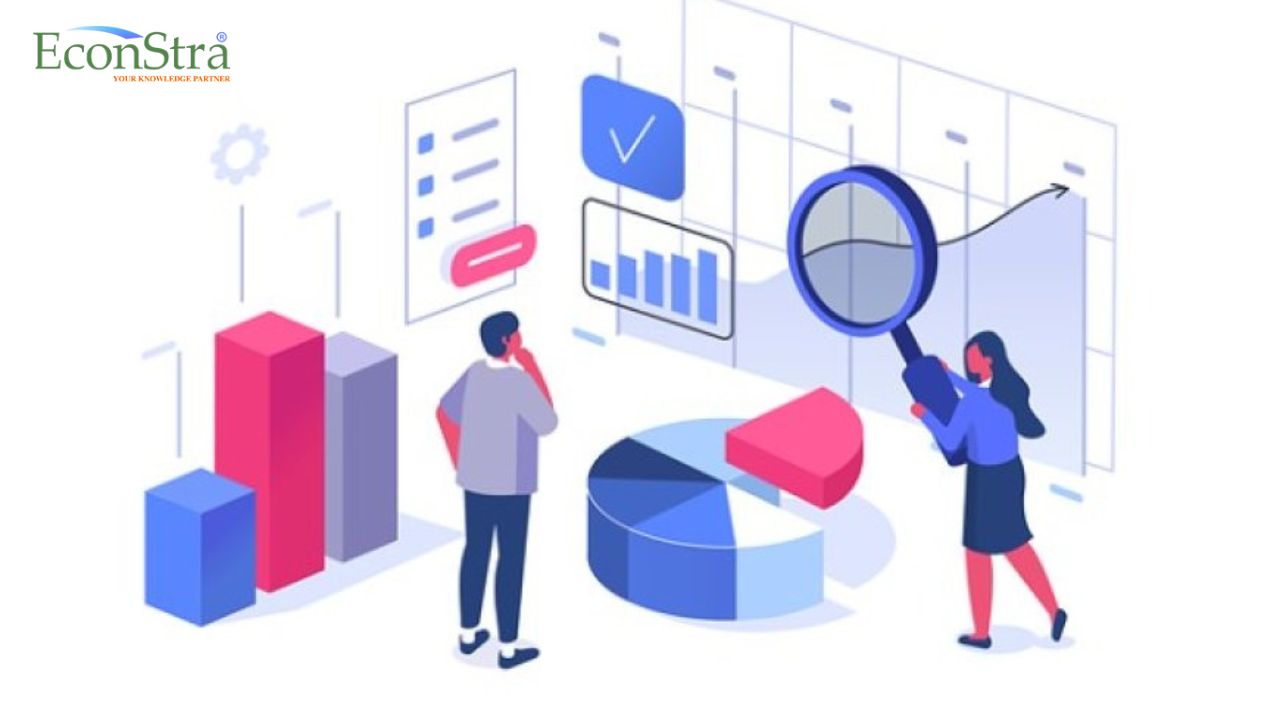by Subhadeep Chowdhury
Share

Utilizing Data Analytics for Informed Business Decisions
Are you ready to unlock the hidden potential within your business data? In today’s digital age, data is more than just numbers and statistics; it is a treasure trove of insights waiting to be discovered. Data analytics, the process of examining datasets to draw conclusions about the information they contain, has become a critical tool for businesses striving to stay competitive and make informed decisions.
In this comprehensive guide, we will delve into the world of data analytics, exploring its importance, methodologies, and how it can be leveraged to transform raw data into actionable business insights.
What is Data Analytics | The Importance of Data Analytics in Business?
Data analytics involves analyzing raw data to make informed decisions. It encompasses various techniques ranging from simple data aggregation to complex predictive analytics, helping businesses understand trends, patterns, and relationships within their data. By transforming data into meaningful insights, businesses can enhance their strategic planning and operational efficiency.
In today’s fast-paced business environment, decisions need to be made swiftly and accurately. Data analytics provides the necessary tools to gain insights into customer behaviour, market trends, and operational efficiency. Businesses that leverage data analytics can:
-
Enhance Decision-Making
By providing factual insights, data analytics helps businesses make informed decisions rather than relying on gut feelings. This involves collecting and analyzing data from various sources to understand trends, patterns, and relationships within the data. Businesses can leverage this information to make strategic decisions that are backed by evidence, reducing the risk of errors and enhancing overall decision quality. For instance, data analytics can help identify the most profitable products, optimal pricing strategies, and effective marketing channels, leading to more successful business outcomes.
Also check our article: How Software Can Help Break Projects Down Into Tasks?
-
Identify Opportunities
Analyzing data can uncover new market opportunities and potential areas for growth by revealing trends and patterns that may not be immediately apparent. Businesses can use data analytics to identify emerging market trends, customer needs, and competitive gaps. This insight allows companies to innovate and develop new products or services, enter new markets, and improve their competitive positioning. For example, by analyzing customer feedback and purchasing behavior, a business might discover a demand for a new product feature or service that competitors have not yet addressed.
-
Improve Customer Experience
Understanding customer behavior and preferences through data analytics allows for the personalization of products and services, enhancing customer satisfaction and loyalty. By analyzing customer data, such as purchase history, browsing patterns, and feedback, businesses can tailor their offerings to meet individual customer needs and preferences. This personalized approach can lead to more effective marketing campaigns, improved customer service, and higher customer retention rates. For example, recommending products based on past purchases or personalizing email marketing content can significantly enhance the customer experience.
Also read : Why Does Every Industry Need A Task Management Tool?
-
Optimize Operations
Data-driven insights can streamline processes, reduce costs, and improve overall efficiency by identifying inefficiencies and areas for improvement within business operations. By analyzing operational data, businesses can pinpoint bottlenecks, optimize resource allocation, and enhance workflow processes. This can lead to significant cost savings and increased productivity. For instance, in supply chain management, data analytics can help forecast demand more accurately, optimize inventory levels, and improve delivery routes, resulting in a more efficient and cost-effective operation. Additionally, predictive maintenance analytics can reduce downtime and extend the lifespan of equipment.
Types of Data Analytics:
-
Descriptive Analytics:
Descriptive analytics focuses on summarizing historical data to understand what has happened in the past. It involves techniques like data aggregation and data mining to provide insights into past trends and patterns. For instance, analyzing sales data to understand monthly revenue trends is a form of descriptive analytics.
-
Diagnostic Analytics:
While descriptive analytics tells us what happened, diagnostic analytics seeks to explain why it happened. It involves examining data to understand the reasons behind past performance. Techniques include data discovery, drill-down, and correlations. For example, if a company experienced a decline in sales, diagnostic analytics would help identify the underlying causes.
-
Predictive Analytics:
Predictive analytics uses historical data to make forecasts about future events. By employing statistical models and machine learning algorithms, businesses can predict trends, customer behaviour, and potential risks. This type of analytics is invaluable for activities like demand forecasting and risk assessment.
Also read: Balancing Risk And Reward In Business Ventures
-
Prescriptive Analytics:
Prescriptive analytics goes a step further by recommending actions based on predictive insights. It not only predicts future outcomes but also suggests the best course of action to achieve desired results. For instance, a retailer might use prescriptive analytics to determine optimal inventory levels to maximize sales while minimizing costs.
Implementing Data Analytics in Business
-
Defining Objectives:
The first step in implementing data analytics is to clearly define the business objectives. What specific problems are you trying to solve? Whether it’s improving customer satisfaction, increasing sales, or optimizing operations, having clear objectives will guide your analytics efforts.
-
Collecting Data:
Data collection is crucial for effective analytics. Businesses should gather relevant data from various sources, including customer interactions, sales transactions, and operational processes. It’s important to ensure data quality and accuracy to derive meaningful insights.
-
Choosing the Right Tools and Technologies:
With a plethora of data analytics tools available, choosing the right ones can be daunting. Popular tools include:
- Business Intelligence (BI) Tools: Examples are Tableau, Power BI, and QlikView, which help in visualizing data and creating interactive dashboards.
- Statistical Analysis Tools: R, SAS, and Python are commonly used for statistical analysis and data modeling.
- Big Data Technologies: Hadoop, Apache Spark, and NoSQL databases are essential for handling large datasets.
- Building a Data-Driven Culture:
For data analytics to be effective, it’s crucial to foster a data-driven culture within the organization. This involves:
- Training Employees: Educating employees on the importance of data analytics and providing training on relevant tools and techniques.
- Encouraging Data-Driven Decision-Making: Promoting the use of data insights in everyday decision-making processes.
- Ensuring Data Accessibility: Making data accessible to all relevant stakeholders while maintaining data security and privacy.
Real-World Applications of Data Analytics:
Marketing:
Data analytics plays a pivotal role in modern marketing strategies. By analyzing customer data, businesses can:
- Segment Customers: Identify distinct customer segments based on behavior and preferences.
- Personalize Campaigns: Tailor marketing messages and offers to individual customers.
- Measure Campaign Effectiveness: Track the performance of marketing campaigns and optimize them for better results.
Supply Chain Management:
In supply chain management, data analytics can help:
Forecast Demand: Predict future demand to optimize inventory levels.
Optimize Logistics: Analyze logistics data to improve delivery routes and reduce costs.
Monitor Supplier Performance: Track supplier performance and identify potential risks.
Also check our article : Steps For A Successful Change Management Process
Finance:
Financial institutions leverage data analytics to:
Detect Fraud: Identify unusual transactions and patterns indicative of fraudulent activities.
Assess Credit Risk: Evaluate the creditworthiness of customers using predictive models.
Optimize Investment Strategies: Analyze market data to develop effective investment strategies.
Human Resources:
In HR, data analytics can be used to:
- Improve Recruitment: Analyze candidate data to identify the best fit for job openings.
- Enhance Employee Retention: Identify factors contributing to employee turnover and develop retention strategies.
- Monitor Performance: Track employee performance and identify areas for improvement.
Challenges in Data Analytics:
-
Data Quality:
Poor data quality can lead to inaccurate insights. It’s essential to ensure data accuracy, completeness, and consistency through proper data management practices.
-
Data Security and Privacy:
With the increasing volume of data, ensuring data security and privacy is a significant challenge. Businesses must implement robust security measures and comply with data protection regulations.
-
Integrating Data from Multiple Sources:
Integrating data from various sources can be complex and time-consuming. Using data integration tools and techniques can help streamline this process.
-
Skill Gaps:
A lack of skilled data analysts can hinder the effective use of data analytics. Investing in training and development can help bridge this gap.
Future Trends in Data Analytics:
-
Artificial Intelligence and Machine Learning:
AI and machine learning are revolutionizing data analytics by enabling more advanced predictive and prescriptive analytics. These technologies can analyze large datasets more efficiently and provide deeper insights.
-
Real-Time Analytics:
The demand for real-time analytics is growing, allowing businesses to make instant decisions based on live data. This is particularly useful in sectors like finance, retail, and healthcare.
-
Big Data and IoT Integration:
The integration of big data with the Internet of Things (IoT) is creating new opportunities for data analytics. Businesses can analyze data from connected devices to gain insights into customer behavior and operational efficiency.
-
Increased Focus on Data Governance:
As data becomes more critical, there is a growing emphasis on data governance to ensure data quality, security, and compliance. Implementing strong data governance frameworks will be essential for future success.
NOTE:
In today’s rapidly evolving business landscape, leveraging data analytics has become imperative for staying ahead of the curve. As businesses navigate complex market dynamics and consumer preferences, the role of data in informing strategic decisions cannot be overstated. At Econstra, a leading business consultant company, we understand the power of data analytics in unlocking valuable insights that drive growth and innovation.
By harnessing advanced analytical tools and techniques, we empower our clients to make informed decisions backed by concrete data-driven evidence. From identifying market trends to optimizing operational efficiency, our tailored analytics solutions equip businesses with the competitive edge needed to thrive in an ever-changing environment. With Econstra’s expertise, businesses can confidently navigate uncertainties and capitalize on emerging opportunities, ensuring long-term success and sustainability.
Conclusion
In today’s data-driven world, harnessing the power of data analytics is no longer optional but a necessity for businesses aiming to stay competitive and make informed decisions. By understanding the various types of data analytics and implementing them effectively, businesses can unlock valuable insights, drive growth, and enhance operational efficiency.
Whether you are looking to improve customer experience, optimize supply chain management, or enhance financial performance, data analytics offers the tools and techniques to transform raw data into actionable business insights.
So, embrace the power of data analytics and take your business decisions to the next level!
STAY IN THE LOOP
Subscribe to our free newsletter.
Business consultant services provide the strategic insight and expertise necessary to steer your company through various challenges and opportunities. These professionals play a crucial role in helping businesses identify growth opportunities, optimize operations, and achieve long-term success. Understanding the Role of a Business Consultant A business consultant acts as an external advisor who brings a […]
In today’s competitive business landscape, companies are constantly seeking ways to reduce operational costs while maintaining or improving efficiency and customer satisfaction. Customer Relationship Management (CRM) systems have emerged as vital tools that enable businesses to achieve these goals. As a leading business consultancy, Econstra understands the importance of leveraging CRM technology to streamline operations, […]
Why Operational Costs Are Draining Your Profits? Operational costs are a critical aspect of running a successful business, but when not managed properly, they can drain your profits and stifle growth. In a competitive market, maintaining profitability requires keen oversight of expenses and strategic planning. Econstra, as a leading business consultancy, provides insights and strategies […]
In the rapidly advancing digital landscape, Artificial Intelligence (AI) tools have emerged as transformative assets for businesses. Their potential to enhance efficiency, streamline operations, and drive innovation makes them invaluable for business consultants and organizations worldwide. For business consultants in India, AI’s strategic application can be particularly advantageous in navigating a diverse and dynamic market. […]





